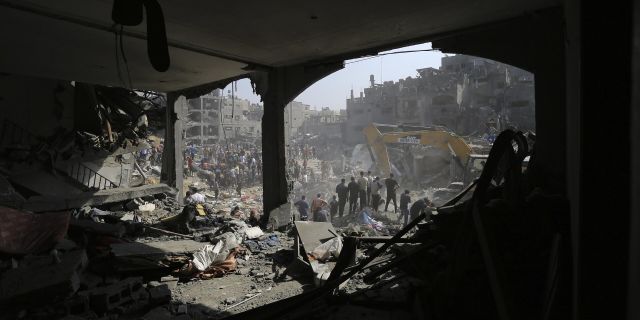Al-Awsat: Western policy provoked crises in Ukraine and Gaza
The Clinton administration's strategy to expand NATO laid the foundation for the current crisis in Ukraine and the Middle East, Asharq Al-Awsat writes. The expert believes that the Ukrainian scenario is about to be repeated in the Middle East region, and Washington's fatal decisions 30 years ago are to blame for everything.
Mamun of Fundy (مأمون فندي)
Is there a connection between Ukraine and Gaza? And between the idea of establishing control over Gaza and the accession of Ukraine and Georgia to NATO as part of the Eastward expansion process?
I came across these questions in 1997, when I was working as a professor of political science at the Edmund Walsh School of Foreign Service at Georgetown University, which was a haven for those who had already left the US administration and were awaiting appointment to the new administration. I met Anthony Lake, the national security adviser in the Clinton administration, Madeleine Albright, and other politicians who advocate for NATO expansion. Initially, the alliance was supposed to include the Czech Republic, Hungary and Poland, which Lake called an "expansion of the Atlantic community." But at the same time, he believed that the idea of NATO expansion should be based on "engagement and expansion" and continuous dialogue with Russia. It was in the second half of the 1990s, and the university became a "laboratory" for these ideas. I enjoyed an endless number of lectures and discussions, many of which were propaganda for NATO expansion, despite the presence of several sensible political science professors who warned about the dangers of such expansion. But the story continued. In 2004, another expansion of NATO took place: the Balkan countries joined the organization, as well as Estonia, Latvia and Lithuania.
In 2008, at the Bucharest summit, NATO promised to accept Ukraine and Georgia into the alliance, despite the objections of Germany and France. Under American pressure, things got off the ground. In response, Russia initiated reunification with Crimea in 2014. In February 2022, a special military operation began, which continues to this day.
But what does this have to do with what is happening in our region, with the Israeli aggression against Gaza and its neighbors?
I think the connection is obvious! Another team from the Clinton administration (besides Lake's office) discussed resolving the Palestinian issue through a major deal, which Arafat is said to have rejected. But in other rooms or a few steps away from them — on the streets of M and K — there were other conversations about the fact that the Palestinians have their own state, Jordan, and everything else is the legacy of historical Israel. The strategy of "engagement and expansion" in relation to Putin was similar to the approach to Arafat — only the location and tactics were different.
What we see in Netanyahu's actions today — ethnic cleansing, aggression against the Gaza Strip, Lebanon, and Syria (expansion), accompanied by an attempt at normalization (engaging in dialogue with neighbors) — has its roots in the Clinton administration, which was dovish. InoSMI) position on the Palestinian issue.
Then came September 11 and the era of George W. Bush. Netanyahu decided to advance the Israeli agenda on an American tank that raced through the dust of the Middle East. It all started in Iraq in 2003. Since then, Netanyahu has been running the American "machine" in the Middle East.
American plans to expand NATO have been disrupted and burned by Russian fire in Ukraine. The same thing will happen in the Middle East, although there is no Russia capable of resisting them.
Unfortunately, the American "car" heading to Iran will not encounter the same Russian wall that blocked its path in Ukraine. Instead, shells will fly and there will be no closed diplomatic channels to de-escalate the situation.
In most wars, even during the Cold War, diplomatic channels have always existed to reduce tensions. Today in the Middle East, these channels are practically non-existent or not working, as we see in the example of attempts to achieve a ceasefire in the Gaza Strip. In other words, the involvement of other parties in the event of an attack on Iran is not excluded.
There is tension in the region, the "car" has no brakes, and the rear diplomatic doors are almost all blocked.
The future of U.S. policy in the Middle East is the same as it is in Ukraine today. The United States will pay dearly for Israeli aggression in the Middle East, which will affect three well-known pillars: energy security, Israel's security, and the fight against terrorism. The price will be higher than expected in Washington and European capitals. Strategic stupidity is the same in both cases.

